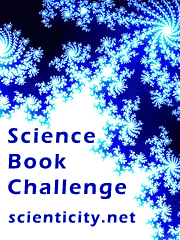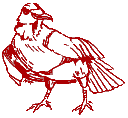Science Book Challenge

History
This project began in 2005 with Science Book Notes, our collection of brief reviews of popular science books, books for all types of non-scientists readers. Thanks to our Science Book Challenge, begun in 2008, our collection of book notes is growing more diverse and more useful every month.
Philosophy
Reading about science is a great way for some people to learn about science. Writing about reading about science is Ars Hermeneutica’s way of catalyzing the interaction between potential readers and authors.
Reading about science for oneself is a personal experience, an excursion into the world of ideas; helping to arrange those rewarding personal experiences is a principle part of Ars Hermeneutica’s mission in science literacy. Our goal is to help match up those who want to discover science through reading with authors who write accurately about the ideas of science in a way that matches an individual reader's abilities and interests.
For the reader who is motivated but bewildered by the vast array of available books, the question is how to choose one that is trustworthy, appealing, and will provide a rewarding experience? Not every book is intended for every reader, but we believe that for every reader there are any number of books can take that reader on an exciting adventure of the mind.
How The Challenge Works
- Read at least three nonfiction books in a calendar year. Your books should have something to do with science, scientists, how science operates, or science's relationship with its surrounding culture. Your books might be popularizations of science, they might be histories, they might be biographies, they might be anthologies; they can be recent titles or older books. We take a very broad view of what makes for interesting and informative science reading.
- After you've read a book, write a short note about it, giving your opinion of the book. What goes in the note? The things you would tell a friend if you wanted to convince your friend to read it--or avoid it. Naturally, you can read some of the existing Book-note ratings for ideas about how to evaluate your books using the ratings that will accompany your book note.
- Don't worry if you find that you've read a book someone else has also read; we welcome multiple notes on one title.
- Get your book note to us and we'll post it with the other notes in our Book Note section. Use the book-note form or the comment form to get in touch with us.
- Tell other people about the Science-Book Challenge: http://scienticity.net/wiki/Science_Book_Challenge.
Stuck for ideas about what books to read? Write to us and we'll help you identify some books that will match your interests.
If you'd like to sign up and make your participation in the Science Book Challenge public, send us your name and a link to your blog, if you have one, using our comment form. You can also join the Facebook group for the challenge.
Please help us tell others, too! Use your own blog to spread the word; use our Science Book Challenge graphic--there's a new one each year--to make it pretty.
